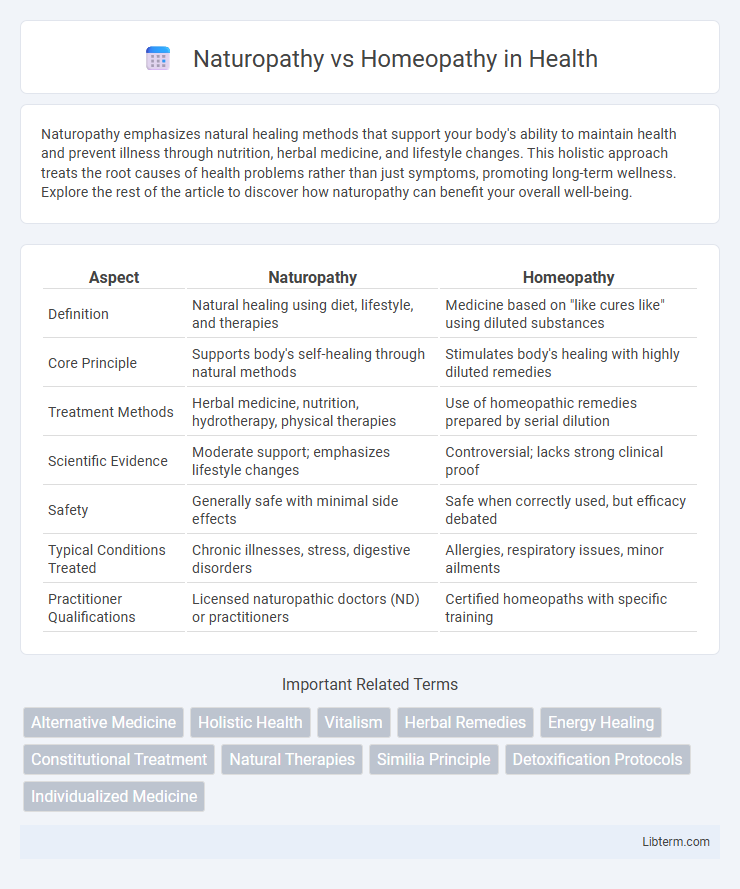Naturopathy emphasizes natural healing methods that support your body's ability to maintain health and prevent illness through nutrition, herbal medicine, and lifestyle changes. This holistic approach treats the root causes of health problems rather than just symptoms, promoting long-term wellness. Explore the rest of the article to discover how naturopathy can benefit your overall well-being.
Table of Comparison
| Aspect | Naturopathy | Homeopathy |
|---|---|---|
| Definition | Natural healing using diet, lifestyle, and therapies | Medicine based on "like cures like" using diluted substances |
| Core Principle | Supports body's self-healing through natural methods | Stimulates body's healing with highly diluted remedies |
| Treatment Methods | Herbal medicine, nutrition, hydrotherapy, physical therapies | Use of homeopathic remedies prepared by serial dilution |
| Scientific Evidence | Moderate support; emphasizes lifestyle changes | Controversial; lacks strong clinical proof |
| Safety | Generally safe with minimal side effects | Safe when correctly used, but efficacy debated |
| Typical Conditions Treated | Chronic illnesses, stress, digestive disorders | Allergies, respiratory issues, minor ailments |
| Practitioner Qualifications | Licensed naturopathic doctors (ND) or practitioners | Certified homeopaths with specific training |
Introduction to Naturopathy and Homeopathy
Naturopathy emphasizes holistic healing through natural therapies like nutrition, acupuncture, and herbal medicine, aiming to stimulate the body's self-healing mechanisms. Homeopathy is based on the principle of "like cures like," using highly diluted substances to trigger the body's natural defenses and restore health. Both systems prioritize personalized treatment and minimizing side effects, but their methodologies and underlying philosophies differ significantly.
Core Principles of Naturopathy
Naturopathy centers on the body's innate ability to heal itself by emphasizing natural therapies such as nutrition, herbal medicine, and lifestyle counseling to restore balance and promote overall wellness. It prioritizes holistic care by addressing physical, mental, and environmental factors that influence health, often incorporating techniques like hydrotherapy, acupuncture, and physical therapies. Unlike homeopathy's principle of "like cures like" using highly diluted substances, naturopathy relies on evidence-based practices to support the body's self-healing mechanisms and prevent illness through natural interventions.
Fundamental Concepts of Homeopathy
Homeopathy is based on the principle of "like cures like," where substances that cause symptoms in healthy individuals are used in diluted forms to treat similar symptoms in sick patients. It emphasizes individualized treatment, minimal dosing, and the vital force concept, which suggests the body's inherent ability to heal itself. Unlike naturopathy, which incorporates a broad range of natural therapies and lifestyle approaches, homeopathy strictly relies on potentized remedies derived from natural substances.
Historical Origins and Development
Naturopathy traces its origins to 19th-century Europe, influenced by Hippocratic principles and the work of Sebastian Kneipp, emphasizing natural healing methods like hydrotherapy and nutrition. Homeopathy was founded by Samuel Hahnemann in the late 18th century, based on the "like cures like" principle and the use of highly diluted substances to stimulate the body's healing processes. Both systems emerged as alternatives to conventional medicine, evolving through distinct philosophies and expanding global practices over the centuries.
Treatment Approaches: Naturopathy vs Homeopathy
Naturopathy emphasizes holistic treatment through natural therapies such as nutrition, hydrotherapy, and lifestyle counseling to stimulate the body's self-healing mechanisms. Homeopathy uses highly diluted substances to trigger the body's immune response, aiming for symptom relief based on the principle of "like cures like." Both approaches prioritize individualized care but differ fundamentally in their methodologies and therapeutic substances.
Common Therapies and Modalities Used
Naturopathy employs therapies such as herbal medicine, acupuncture, nutrition counseling, and hydrotherapy to stimulate the body's natural healing processes. Homeopathy utilizes highly diluted substances selected based on the principle of "like cures like," commonly administered in the form of small sugar pellets or liquid remedies. Both approaches emphasize individualized treatment plans but differ significantly in methodology and therapeutic substances.
Scientific Evidence and Effectiveness
Scientific evidence supporting naturopathy and homeopathy varies significantly, with naturopathy often grounded in dietary and lifestyle interventions supported by clinical research, while homeopathy lacks robust empirical validation due to its reliance on highly diluted substances. Systematic reviews and meta-analyses consistently show that homeopathy's effectiveness is comparable to placebo, whereas naturopathic treatments, especially those involving nutrition and herbal medicine, demonstrate measurable benefits in managing chronic conditions. The disparity in scientific credibility emphasizes the importance of evidence-based approaches when considering naturopathy or homeopathy for health care.
Safety and Potential Risks
Naturopathy emphasizes natural remedies and lifestyle changes, generally posing low safety risks when guided by trained practitioners, but may involve potential hazards if self-administered without adequate knowledge. Homeopathy uses highly diluted substances, often regarded as safe due to minimal active ingredients, yet risks arise when it replaces conventional treatments for serious conditions, potentially delaying essential medical care. Both disciplines require careful consideration of practitioner qualifications and patient health status to minimize adverse outcomes and ensure appropriate therapeutic use.
Choosing Between Naturopathy and Homeopathy
Choosing between naturopathy and homeopathy depends on individual health needs and treatment preferences. Naturopathy emphasizes holistic healing through natural therapies such as nutrition, exercise, and lifestyle changes, aiming to support the body's innate ability to heal. Homeopathy uses highly diluted substances to stimulate the body's self-healing response, focusing on treating symptoms with minimal side effects.
Conclusion: Which Path is Right for You?
Choosing between naturopathy and homeopathy depends on individual health goals, treatment preferences, and medical conditions. Naturopathy emphasizes holistic lifestyle changes, nutrition, and natural therapies to support overall wellness, while homeopathy focuses on highly diluted substances to stimulate the body's self-healing response. Consulting with qualified practitioners and considering evidence-based outcomes helps determine the most suitable path for personalized healthcare.
Naturopathy Infographic

 libterm.com
libterm.com